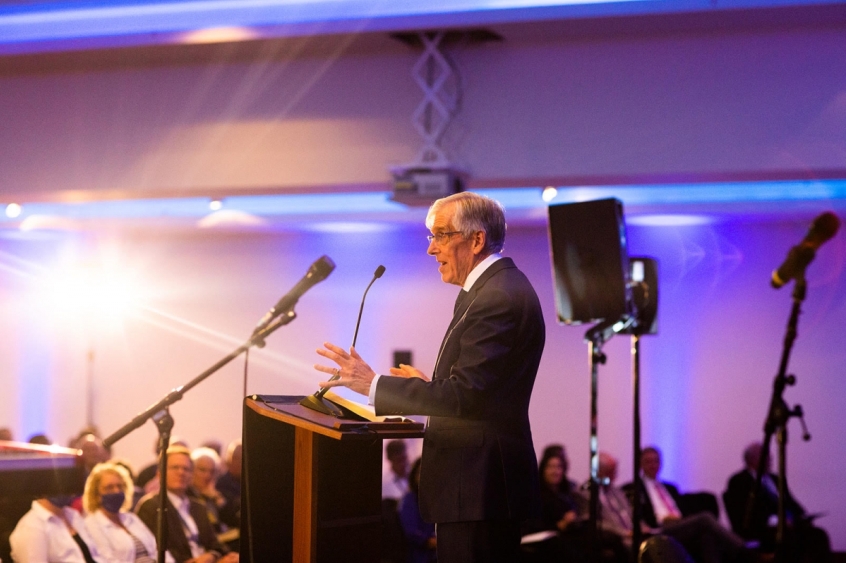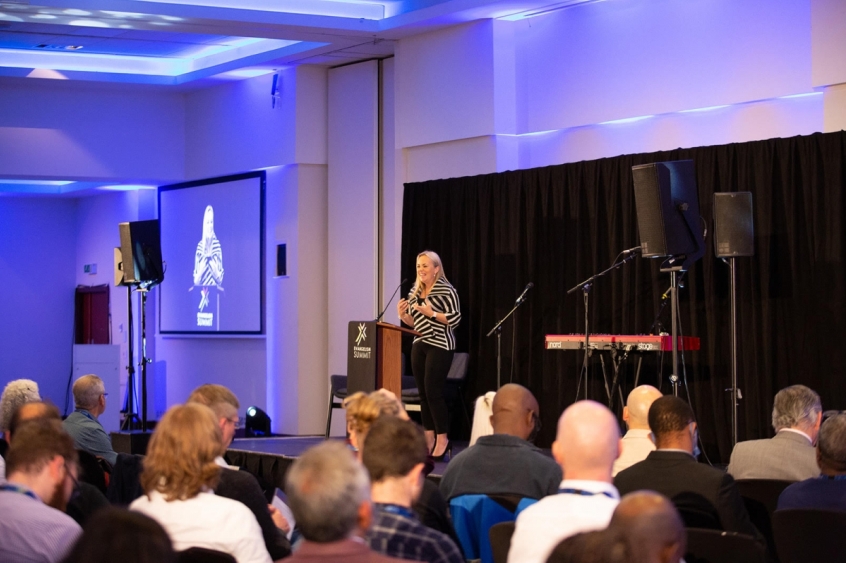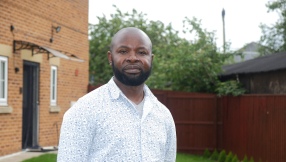
There are many challenges facing the UK Church but with the pandemic receding, there are also many opportunities, says the Rev Hugh Osgood.
The Free Churches Moderator was addressing hundreds of pastors and evangelists at the first of four Evangelism Summits being hosted across the UK by the Billy Graham Evangelistic Association (BGEA).
Rev Osgood told participants at Tuesday's summit in Glasgow, Scotland, that God had used the pandemic for good and that while there were "big challenges", it was important that the Church "come at these things with a confidence".
"Somehow in all that we've gone through, God is more interested in saying to us: actually, I've made the land more fruitful. Somehow that hard land is being broken up by what we've gone through. I don't know how and I don't understand why, but I want to go out with a new confidence to plant seed in that soil," he said.
In a session on defending the Gospel, apologist Dr Amy-Orr Ewing warned that social media and AI algorithms were making it easier than ever for people to retreat into their own "echo chambers" instead of engaging with different ideas.
She challenged pastors to "break through" the echo chambers of the current age, while also avoiding the temptation to retreat into echo chambers of their own.
"This is a massive challenge for reaching the next generation. We need to get smart and creative," she said.
She also admitted it could be "wearying" to minister in the present spiritual climate, and that she was "deeply concerned" about the state of both the nation and the Church, and the "catastrophic confusion" around identity.
"I have never known a time where so many Christian leaders are so discouraged, and so I want to encourage you again today to ask that question: do I really believe in Jesus? Do I really believe the Gospel is Good News in our time? And ask Him to build and grow personal faith in us," she said.

Dr Orr-Ewing said the challenge was to "defend and contend" for the Gospel in this present time, and speak the Good News of Jesus and every person being made in the image of God into the "vacuum of meaning" left by postmodernism.
"As we defend and contend for the Gospel, we need to [do this] in creative and personal ways outside of our own echo chambers," she said.
The BGEA summits are free and will next be held in Liverpool on 14 October, Cardiff on 19 October, and London on 15 November.
Speaking to Christian Today about the Evangelism Summits, Rev Osgood said they were a reminder of the importance of face-to-face gatherings, and that it was "timely" to host the events now as the UK emerges from the pandemic.
"The pandemic was very disruptive and that means people are having to do some thinking about what could be done better. So there are some real opportunities," he said.
Commenting on the challenges to evangelism in the UK, he said it was important that Christians engage positively in society.
"The Church needs to recover its confidence and that I think is the big challenge for evangelism," he said.
"It's so easy for the Church to blame how hard the ground is but I feel that, in some ways, the ground is softer now than it's ever been.
"We need to be confident in the Gospel we proclaim - the cross, the work of the Spirit and to some extent the Church, that we can rise up and make a difference.
"The Church is too good at putting itself on the back foot when we could really step out and make a difference.
"We can't blame the world and increased secularization because the early church was birthed in an unreceptive environment and yet it made an impact. The challenge for us is to make an impact."
UK evangelist Roger Chilvers, who helped coordinate the BGEA summits, echoed the call for a more confident Church.
"In the past, we have been in a sense unwilling to upset people, and Covid has helped us to see that life is fragile and so we need to preach the centrality of the cross with clarity and boldness. We must get over this 'embarrassment', if you like, about the cross," he said.
His comments echoed an earlier session at the summit led by Dr Charles Price, who exhorted ministers to preach on the power of the cross.
"You and I need to ask in our own ministries: am I preaching the cross? Now, it's foolishness to people and we're embarrassed by that so we kind of hold back a bit. We want to preach nice things people will like but we've got to come back to the cross," he said.
Despite the disruption caused by Covid, Chilvers was positive about the growth experienced by many churches during the pandemic and the way in which churches are using this time to think about how they can adapt to the post-Covid world.
"Now that we're coming out of the pandemic, most churches are beginning to ask themselves: are we just going to go back to how we were before or is God telling us to do something different?" he said.
"The summits in these four cities are taking place to help churches think through not so much the nuts and bolts of how to do evangelism but the foundational aspects, like the centrality of the cross and discipleship and defending the Gospel.
"While Covid has had a negative effect on church life in many areas, there are also many churches that have grown very unexpectedly during Covid and I think that's because not only the Church but society itself is beginning to ask 'where are we going?' and 'what is life about?'."













